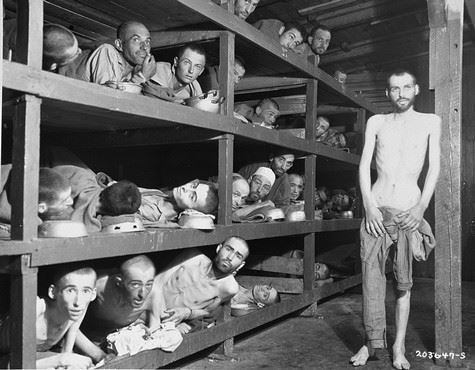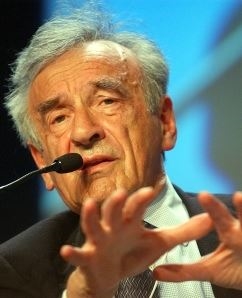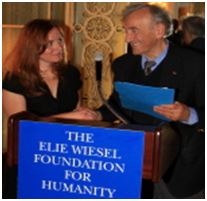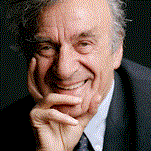 |
| (http://library.thinkquest.org/12663/media/img/wiesel.jpg) |
Imagine a world where hope was nonexistent. A time when humanity was losing the war against evil and clawing its way out of a hole filled with gloom. A time when the possibility of death robbed the world of joy and security. Elie Wiesel grew up in this world. Born in 1928, he spent a fragment of his youth in concentration camps during Germany’s quest to conquer Europe and exterminate the world of Jews, blacks, homosexuals, and disabled people during the Holocaust. From the lack of individuality and nameless faces in this picture came one of the world’s greatest peace warriors. Elie Wiesel serves as a hero not only because he overcame adversity in a positive manner, but also for representing afflicted people with no voice.
Elie Wiesel was born in Sighet, Hungary on September 30, 1928 and grew up an observant Jew following thousands-of-years-old traditions and customs. When Wiesel was fifteen, Nazis raided Hungary and by cattle trains transported the Jewish population to ghettos and concentration camps. These camps were the Nazi’s solution to killing the European Jews. His family, consisting of both his parents and three sisters, was separated and sent to different concentration camps: Auschwitz and Birkenau. Wiesel and his father stayed in Auschwitz until January 1945. From there they were transferred to the concentration camp Buchenwald in the now infamous death march. On April 11,1945, the United States army liberated Buchenwald, saving Wiesel's life. The Holocaust left only Wiesel and his two older sisters alive. After being rescued, Wiesel moved to France where he studied at the Sorbonne for literature and worked as a French journalist for an Israeli newspaper. In 1956, Wiesel moved to New York to report on the United Nations and became a U.S. citizen in 1963. Over the course of his life, Wiesel wrote fifty-six books consisting of novels and memoirs about Judaism and his holocaust experiences. Elie Wiesel won hundreds of awards from presidents and other powerful, public figures for devoting his life to fighting genocide and indifference. He also started The Elie Wiesel Foundation for Humanity which contributed to the fight against injustice in Cambodia, South Africa, and South America. This led him to becoming “an international ambassador for peace and freedom” (Wiesel, Elie (1928-) Discovering Biography). To this day, Elie Wiesel lives to spread peace and human rights.
 |
| (http://1.bp.blogspot.com/_l8ZBsSeLPxk/SbfaBr9lMMI/AAAAAAAACGA/KbRAOE29ZCY/s400/485px-Elie_Wiesel.jpg) |
Although the holocaust was a turbulent event in Elie Wiesel’s life, he does not allow the incredibly trying experience to consume him. On the contrary, he channels his grief to help others. When Wiesel was awarded the Noble Peace Prize, the committee remarked, “how impressive it was that a man could experience so much destruction, hate and suffering and still become ‘a spokesman for peace and conciliation’” (“Wiesel Is Awarded the Nobel Peace Prize”). Wiesel converted his negative feelings from the Holocaust to spread peace and conciliation throughout the world. There are many examples of Wiesel’s commitment to creating positive futures for impacted communities. For example, the Elie Wiesel Foundation for Humanity enriched the lives of rescued Ethiopian Jews living in Israel in the mid 1990’s by creating two educational centers, known as the Beit Tzipora Centers. These centers “focus[ed] on educating the Ethiopian-Jewish community and giving Ethiopian-Israeli young people the opportunity to grow and participate fully in Israeli society”( Elie, Wiesel.“Beit Tzipora Centers"). Wiesel’s desire to help others motivated him to smooth the transition for Ethiopian Jews to integrate into Israeli society. Likewise, Wiesel’s Foundation funded programs that provided “educational support” and “extend[ed] its efforts related to the genocide in Darfur from advocacy to helping Darfurian children adjust to their new lives in Israel” in 2007(Elie, Wiesel. “Darfurian Refugee Program.”). Once again, Elie Wiesel reached out to an embattled community and promised its youth a brighter future. Perhaps from his own experience as a holocaust survivor he realized the importance of creating a future for scarred children where hatred, genocide, and indifference do not affect their lives as adults.
 |
| (http://www.eliewieselfoundation.org/) |
Elie Wiesel acts as the voice for the unfortunate who are mistreated and starved of human rights. Without a doubt, no matter how much power is accessible to Wiesel, he never fails to use it successfully by directing it to help the people in need. Throughout Wiesel’s life he served as a representative for the voiceless: combating injustice, intolerance, and indifference. “He has led the United States Holocaust Memorial Council and protested on behalf of oppressed people everywhere-Soviet Jews as well as groups in Cambodia, Biafra, Bangladesh, Latin America, and the Middle East, among others. In addition, he has organized international symposia on human relations, taught throughout the world, and interceded with world leaders for the sake of human rights”(“Wiesel Is Awarded the Nobel Peace Prize”). Wiesel’s commitment to fighting oppression is not limited by race, country or political pressure. He intercedes, like a true leader, to spread human rights and protest for the people who are unable to speak up for themselves. After winning the Nobel Peace Prize in 1986, the Wiesels established the Elie Wiesel Foundation for Humanity, its mission to “promote acceptance, understanding and equality”(Elie, Wiesel. “About Us.”). Wiesel overcame his horrific experiences by giving voice to people who could not speak up for themselves. When Elie Wiesel was awarded the Nobel Peace Prize he said in his acceptance speech, "Humanity's moral task is to transform injustice—including God's—into human justice and compassion”(Quoted in "Wiesel Is Awarded the Nobel Peace Prize”). He knows what it feels like to not have a voice, and he uses this knowledge to promote human rights. His fight for justice provides the world with peace and hope.
 |
| (http://www.eliewieselfoundation.org/) |
Elie Wiesel is an inspiration due to his commitment to justice and his determined vision for a moral and verdant world. Wiesel once said, “It is what you do that makes you moral or not,” as he advised his audience of high school students to “identify injustice and denounce it." (Quoted in "Wiesel Warns Against Injustice, Indifference."). Clearly this quote means that actions are more powerful than words. Elie Wiesel promoted strong morals as a way to successfully denounce injustice. It is noted that, “While he [Wiesel] could have fallen into nihilism and hatred after the Holocaust, having felt betrayed by God and society, Wiesel said that would have destroyed him. 'Accepting despair is not an option,' he said. 'We must simply do whatever we can so justice can prevail'" ("Wiesel Warns Against Injustice, Indifference."). The survivor and soldier of peace has continuously inspired people to fight for justice even in the face of death. On the day that Wiesel won one of the most honorable awards he, "...added that the Nobel Peace Prize would give him an opportunity to 'speak louder' and 'reach more people' in defense of human rights"("Wiesel Is Awarded the Nobel Peace Prize"). Wiesel is a hero for the simple reason that upon winning the Nobel Peace Prize he still wanted to extend his morals to a larger scale. Because he proved to be a hero through his power to react adequately to calamities, embody voiceless people and inspire others to fight for justice and act with morals, Elie Wiesel definitely earned the title of hero.
Page created on 5/20/2010 12:00:00 AM
Last edited 5/20/2010 12:00:00 AM
